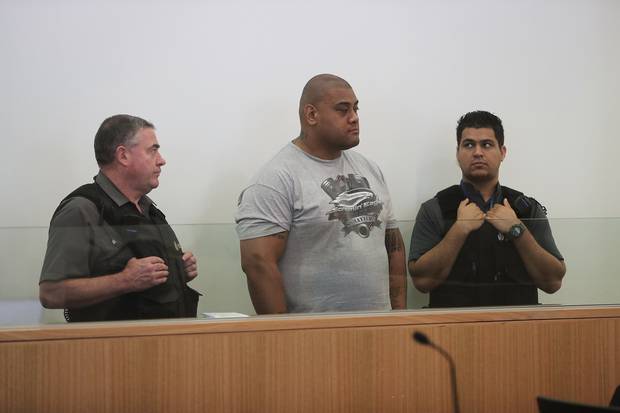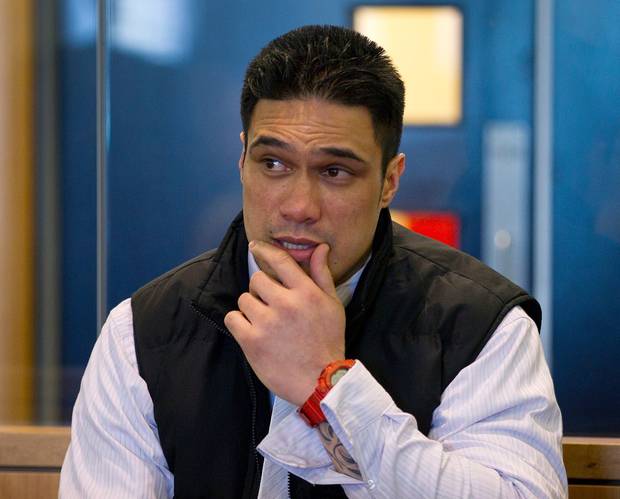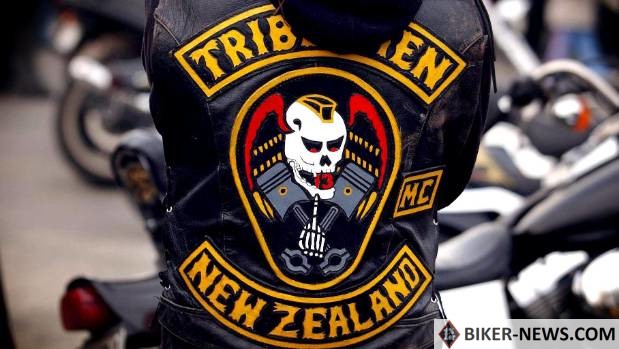Okusitino Tae fired one round at Josh Masters and the bullet lodging in his spinal cavity. With Masters lying on the ground defenceless, Tae kept walking towards him and pointed the gun at his head. He pulled the trigger but nothing happened. The 9mm pistol had jammed. On 26-th of May 2020 the Tribesmen MC member was sentenced for the shooting which left his former friend in a wheelchair for the rest of his life.
A former close friend of Josh Masters was sentenced to seven years in prison after shooting the Killer Beez president, which left him paralysed and in need of caregiver assistance for the rest of his life.
Okusitino Tae, 40, was sentenced in the High Court after pleading guilty last month to a charge of wounding with intent to cause grievous bodily harm.

Tae was one of the original members of the Killer Beez, the street gang led by Masters since the early 2000s, but is now the sergeant-at-arms of the Tribesmen motorcycle club in Otara.
The Killer Beez have long been a feeder gang for the Tribesmen but the summary of facts for the shooting noted “tensions developed” between the club and gang after Masters’ release from prison in 2018, after coming to the end of his 10 year 5 month sentence for methamphetamine offending.
On 26 April 2019, Masters went to the Auckland Harley Davidson dealership on the Mt Wellington Highway to pay for repairs to his motorcycle.
Two minutes after he left the dealership on this motorcycle, Tae and another man arrived in a black Toyota Vitz hatchback.
Masters returned a few minutes later, as his motorcycle gear was playing up, so decided to return to the dealership immediately.
He was wearing a bright white Killer Beez gang patch and was easily recognisable to Tae. As he rode his motorcycle to the service area, Tae pulled out a black semi-automatic 9mm pistol from his pocket.
He fired one shot and the bullet travelled through Masters’ left arm, into his side and lodged in the spinal canal.
Masters fell to the ground with the motorcycle on top of him.
Tae tried to manually reload the pistol, by pulling the slide back, without knowing the firearm automatically reloaded a second bullet into the chamber.
His attempt to manually reload the pistol ejected the chambered round into the breech, where it jammed.
By this point, Tae was just a few metres away and pulled the trigger twice more but the pistol failed to fire because of the jam.
He kept walking towards Masters while trying to rack the top slide of the pistol, which ejected the only remaining bullet.
Tae stopped walking when he was standing over Masters and pointed the pistol at his head, pulling the trigger but nothing happened.
Witnesses heard someone yell words to the effect of “I told you not to come around here”, then Tae calmly walked back to the Toyota and left.
Within an hour of the shooting, Tae – through his lawyer Lorraine Smith – contacted the police and arranged to hand himself in.
Over the course of the next eight hours, Smith told the High Court today, Tae met with senior members of the Tribesmen and the Killer Beez for truce talks to ensure there was no further trouble.
Later that night, Tae met with Smith and surrendered himself into the Manukau Police Station and handed over the pistol.
He pleaded not guilty to attempted murder and the case was scheduled for a jury trial in the High Court at Auckland next month, which was adjourned indefinitely following the Covid-19 lockdown.
Despite the not guilty plea, from an early stage in the prosecution Tae had offered to admit guilt to an alternative charge of wounding with intent to cause grievous bodily harm.
The deal was originally rejected by the Crown, which believed the question of an intent to kill should be determined by a jury.
But there was a change of heart because of the trial delay, and the fact the maximum penalty of 14 years’ imprisonment for wounding with intent to cause grievous bodily harm is the same as attempted murder.
For that reason, and others such as the saved time and expense of a trial, as well as Masters refusing to be a witness, the Crown accepted the offer and Tae pleaded guilty in April 2020, almost 12 months to the day since he gunned down Masters.
At the High Court hearing this morning, his lawyer Lorraine Smith agreed with the Crown submissions that the sentence should start at 11 years.
But she argued Tae deserved significant discounts for his guilty plea, his dysfunctional background outlined in a cultural report, and his genuine remorse.
Tae wanted to meet with Masters in a restorative justice conference, and to show the offer was genuine, Smith read out quotes attributed to Tae.
The pair became friends in 1998 selling cannabis together and Tae said Masters “always looked after me, protected me, had my back. And I had his.”
“Josh will always be my brother, I will always love him. I am deeply sorry for what I did for him. I wish I could take it back every single day.”
Tae declined to explain why he shot his friend, although Masters had visited him prior to the shooting and Tae was said to be fearful for his safety, and that of his family.
Justice Matthew Palmer accepted the starting point of 11 years for the offence and gave Tae discounts for the guilty plea, his background and remorse, to end with a final sentence of seven years.
The judge also declined to impose a minimum period of imprisonment, which means Tae will be eligible for parole after serving one-third of the sentence.
It also emerged at the hearing that everyone (inlcuding his lawyer) had been spelling Tae’s first name wrong, which is in fact Okusitino – not Akustino. He was also seriously considering leaving the Tribesmen, said Smith, although Justice Palmer was sceptical Tae would follow through.

Mystery surrounds Tae’s motivation for shooting Masters, as neither spoke to the police.
The pair were once very close friends, part of the tight core of the Killer Beez gang which sprouted up in Otara in the early 2000s as a feeder group to the more established Tribesmen motorcycle club.
The lines between the clubs were so blurred Masters, once described by a High Court judge as a charismatic leader with undoubted business acumen, also held a senior position in the Tribesmen at one point.
His profile grew to the point John Campbell interviewed him for prime time television, where Masters denied the Killer Beez had any involvement in methamphetamine.
At the time of the interview, a covert police investigation called Operation Leo was already underway.
More than 110,000 communications were intercepted between February and May 2008 when Masters and 43 other Killer Beez and Tribesmen associates were arrested.
Police seized about $500,000 worth of meth and cannabis, $20,000 cash, a large amount of stolen property, and motorcycles and cars under the Proceeds of Crime Act.
At the time of the arrests, Detective Inspector John Tims – now a deputy commissioner – said the Killer Beez tried to portray themselves as “modern-day Robin Hoods”.
“They have attempted to achieve status through music and videos in connection with the youth of our community,” said Tims.
“Based on the evidence secured throughout this operation and today, in simple terms they are drug dealers who are causing destruction and chaos in our community by their actions.”
For the next four years, Masters dragged out the court case although he was eventually sentenced to 10 years 5 months in prison after pleading guilty to supplying methamphetamine, conspiracy to supply the Class-A drug, and laundering money through his record label.
While the influence of the Killer Beez in the community was greatly diminished by Operation Leo, Masters’ army continued to grow inside the prisons where the gang actively recruited.
The “swarm”, as members call themselves, now number in the hundreds.
Masters’ own behaviour in prison was described as “confrontational and at times intimidatory”, according to the Parole Board, as he ran the Killer Beez from behind bars.
This was the main reason he was declined release on parole on several occasions until May 2018, when he was no longer considered an “undue risk” to the community.
He now faces a life confined to a wheelchair and needs the assistance of a fulltime caregiver.
Make sure you have subscribed to our Facebook page or Twitter to stay tuned!
Source: NZ Herald
